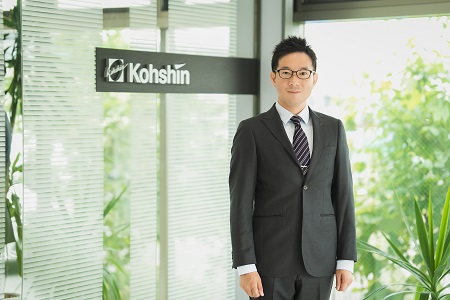In July 2023, Kohshin Engineering warmly welcomes its new CEO, Mr. Kazunori Sumiya.
What prompted the company to expand overseas?
In 2000, when subsidies for poultry manure processors were cut off and the domestic market reached a ceiling, I was sent overseas to develop the market through a trial-and-error process. 23 years have passed since the company entered overseas markets, and I feel that the name Kohshin Engineering is finally gaining recognition in the poultry farming equipment sector overseas. While I have been primarily responsible for South America, Europe, Russia, and China, I recently discovered that the company is well-known among Asian customers.
What are your company’s key products?
The main product of Kohshin Engineering is a fermentation machine used for composting. In Japan, the separation of arable and livestock farming has led to compost being treated as industrial waste. Livestock farmers struggle to process manure, while arable farmers find it challenging to use it as fertilizer, resulting in unstable product quality. This lack of matching between the two industries is a concern.
However, in South America, where I was previously assigned, it is common for the same owners to manage both livestock and farming operations. In these areas, the focus is not only on processing manure but also on deriving value from the fertilizer itself to improve crop yield and reduce disease. Kohshin aims to promote compost circulation worldwide by creating a system for its use in farmland and society as a whole.
How exactly are you working on this?
For the past 50 years, our company has focused on making durable machines. However, when it comes to compost production, the machines only play a small role in agitation. The actual process is carried out by micro-organisms. Realizing this, we shifted our focus to understanding how these micro-organisms work in order to improve compost quality. We started learning about environmental impact and microbial fermentation, which led us to install temperature and oxygen sensors to collect data. This data gave us valuable insights, such as oxygen consumption and heat changes.
Motivated by these findings, we developed the Soilath® System, which allows customers to monitor and understand the reactions and processes of microorganisms. This led to positive outcomes like reduced odor production and lower consumption rates. Customers also appreciate the ability to accumulate data and gain knowledge. In response to this demand, we developed software to control the blower using the data and enable remote operation via the cloud. The need for remote monitoring has grown, especially during the COVID-19 pandemic. Collecting data over time and gaining insights from microorganisms is crucial in composting technology, which has recently started progressing due to advancements in data collection technology. The goal is to make composting faster and efficient, with minimization of odor as a challenge to be addressed in the future.
Will compost become more important in the future?
The importance of compost is increasing due to a decrease in the supply of chemical fertilizers caused by the Russian-Ukrainian war. There is a movement to promote the use of compost globally. A device called Soilath® Blender compensates for the drawbacks of compost and chemical fertilizers by producing a uniform mixture. It has the potential to expand the market for compost sales. The goal is to achieve local production of fertilizers in emerging countries and bridge livestock farming with arable agriculture.
How about implementing labor-saving and automation technologies in livestock farming?
Our company, with a focus on automation, has developed the cage washing robot VENUS. We believe that people's time is valuable and should be spent on creative and idea-driven work, while monotonous tasks should be automated. We aim to develop new machines in the agricultural and livestock sectors, addressing areas where people struggle and focusing on cost-effective solutions.
What is your opinion about the Japanese brands in the international market?
I believe that there is more room for challenge in emerging countries compared to the Japanese market. These countries provide an environment that allows for trial and error and encourages growth. I am also concerned about whether the brand power of "Made in Japan" will last forever. If we do not establish the value of our own brand, Kohshin Engineering, before the value of Japanese brands declines further, we will lose out in the international market competition. Currently, foreign manufacturers are producing copies of our products, which is troubling. However, the fact that our products are being copied is seen as proof that we are still producing promising products.
Could you tell us about the recent orders?
The factory has received many orders and is fully booked for the next six months and until the end of December. We still can handle a 60-70% increase in production with more manpower. The company's core is now its overseas network, with 30% of employees being foreign nationals and 30-40% able to speak English. We have been outsourcing and trading globally for good quality materials at low prices. We plan to set up bases overseas for office-related operations and promote further overseas development. I have already started thinking about the company's future direction related to fertilizers and agriculture. This is a major turning point for us.



















